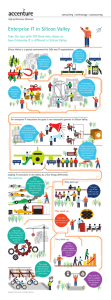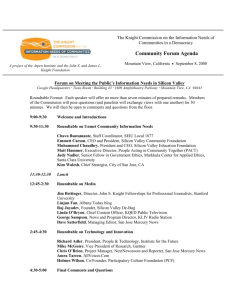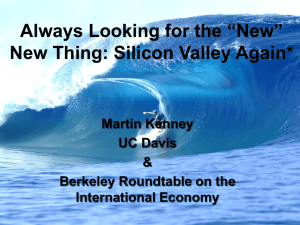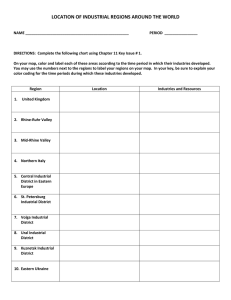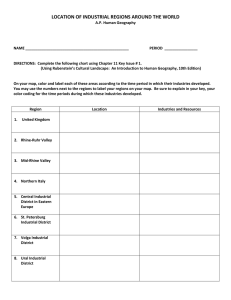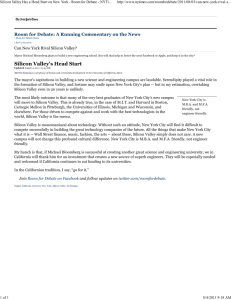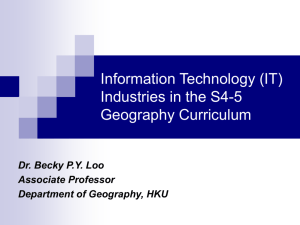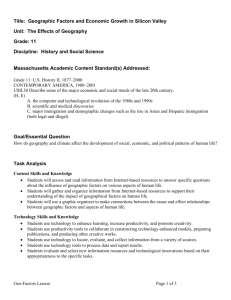Silicon Valley
advertisement
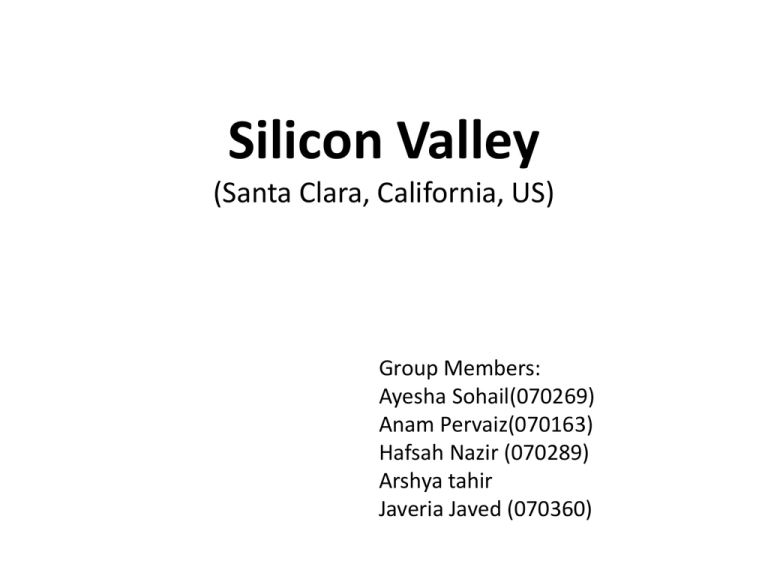
Silicon Valley (Santa Clara, California, US) Group Members: Ayesha Sohail(070269) Anam Pervaiz(070163) Hafsah Nazir (070289) Arshya tahir Javeria Javed (070360) Location and History • Location Silicon Valley is an area that "located on the San Francisco, California, peninsula, radiates outward from Stanford University. It is contained by the San Francisco Bay on the east, the Santa Cruz Mountains on the west, and the Coast Range to the southeast. • History Since the early twentieth century, Silicon Valley has been home to a vibrant, growing electronics industry. The industry began through experimentation and innovation in the fields of radio, television, and military electronics. Stanford University, its affiliates, and graduates have played a major role in the evolution of this area. Significance • It is the hub of information technology. • • Most of the major companies are situated there e.g. Hewelett-Packard, Intel , Google , e bay , apple etc. Most of the major inventions had taken place here. • It is like a backbone in US economy. • Demographics • • • • • • Area: 1,854 square miles Population: 2.9 million Jobs: 1,322,634 Average Annual Salary: $75,390 Foreign Immigration: +14,264 Domestic Migration: -3,728 Adult educational attainment: • • • • • 11% Less than High School 18% High School Graduate 28% Some College 26% Bachelor’s Degree 17% Graduate or Professional Degree • • • • • • • • • • • • Age distribution: 13% 0-9 years old 13% 10-19 36% 20-44 26% 45-64 12% 65 and older Ethnic composition: 40% White, non-Hispanic 29% Asian, non-Hispanic 25% Hispanic 2.6% Black, non-Hispanic <4% Multiple and Other • • • • • • • Foreign Born: 36% Origin: 58% Asia 31% Americas 9% Europe 1% Oceana 1% Africa PEOPLE Population Growth Immigration Society • • • • Education Health Safety Culture Place • Environment – Protected open space – Solar installation – Water resources – Electircity Place • Transportation. – Means of commute – Transit use – Gas prices – Fuel consumption per capita Place • Land use – Residential density – Housing and development – Home affordability – Renewable energy permitting. Place • Commercial space – Commercial vacancy – Commercial rents – New commercial development ECONOMY Employment • Monthly Jobs and Change in Total Nonfarm Jobs • Quarterly Job Growth • Unemployment Rate • Employment Services, Total Number of Jobs by Month • Nonemploying Firms • Major Areas of Economic Activity • Total Business Establishments Jobs in the Core Green Economy Economy Income • • • • Real per Capita Income Median Household Income Income Distribution Rate of Total Non-Business Bankruptcy Filings per 1,000 Persons • Food Stamp Usage Economy Innovation • Value Added per Employee • Patent Registrations • Patents Registrations by Technology Area • Green Technology Patents • Venture Capital: Total, by industry, Share of U.S. • Cleantech Venture Capital: Total & by Segment • Initial Public Offerings • Mergers & Acquisitions • Silicon Valley Churn: Establishments Governance • Civic engagement Voter participation • Revenues City Revenue by Source and City Revenue Trends Municipal Debt Obligations Issued Regional-State Interface INDUSTRIES (IT & TECHNOLOGY) • The role of Stanford University • Prof. Frederick Terman played a crucial role in the development of the local high-tech industry after and before World War II • During 1930s students of Stanford founded many small electronic companies (Hewlett Packard.) • Stanford industrial park • Defense programs stimulated Silicon Valley growth during 1950s. • In 1950s silicon came to the valley • During 1960s and 1970s, Silicon Valley high tech industry moved from specialized high tech to mass production (Intel) • The PC revolution • Silicon Valley to Internet Valley • Research and development Venture Capital Industry • The semi conductor industry brought many bioinformatics, or computational molecular biology. • Fairchild's success led also to an extraordinary entrepreneurial expansion on the Peninsula in the • Electronic component businesses and the venture capital industry provided the foundation for Silicon Valley's explosive growth around new system industries such as computing, instrumentation, and telecommunication in the 1970s and 1980s Biotech Industry and pharmacy • In parallel with the explosion of the information technology industries, the Valley saw the emergence of a new sector, biotechnology, in the second half of the 1970s and in the 1980s with the discovery that DNA could be cloned. • The University of California, San Francisco (UCSF), Stanford, and the University of California, Berkeley had strong molecular biology programs – which acted as a breeding ground for scientists as well as the source of key innovations. • Also, the Valley's venture capital industry heavily funded biotechnology businesses and in some cases played a critical role in the formation of biotech corporations • The region's strength in biotechnology and information technologies gave birth to hybrid technologies and industries like bioinformatics, or computational molecular biology. • Today, the region is clearly the national leader in biotechnology • In 2003 venture capital investment in life sciences outpaced investment in all other industry sectors. • Estimates predict that by 2010, the biotech industry will grow by nearly 30 percent. Clean Tech and Energy industry • U.S. concerns about energy are probably greater today than at any • The more immediate drivers for the interest in alternative energy today are technological improvements and declining costs. • Silicon Valley is advancing in technologies regarding sprayable solar coatings for roofs, cheaper catalytic converters, wave energy, Clarke Energy (natural gas from landfills); and Bowman Power (micro turbines). • At Stanford's engineering school, one of three primary research areas is fossil fuel alternatives, or "clean" technology. ExxonMobil, Toyota, Schlumberger and General Electric together are expected to invest $225 million in the university's Global Climate Energy Project by 2010. • Government regulations • Concept of hybrid cars Agriculture and Dairy Industry • Before its industrial period, the region was an agrarian economy • By the 1920s, as farms began to industrialize, a big push occurred next in manufacturing, namely in automobile production, shipbuilding, and food canning. • Agriculture accounts for just slightly over 2% of California's $1.85 trillion gross state product • California agriculture is nearly a $36.6 billion dollar industry that generates $100 billion in related economic activity • California is the leading dairy state • The rise of California’s dairy industry from humble beginnings to national and even international prominence is a story of technological innovation, legislative efforts, and masterful marketing, but most of all the cooperative spirit and organizational acumen of its dairymen. ANALYSIS • Global connections – Global venture capital flows – Foreign born students – Changing global Market • Talent – Demographic patterns in population ability – Occupational concentrations – Flow of foreign born talent. Analysis • Technological change – Patents, registrations by technology areas and global patent collaboration – Trends in venture capita investment – Industrial composition change Analysis • Federal policy – Small business innovation research and small business technology transfer awards. – Funding per dollar 1 million GDP – Procurement patterns by agency – Stimulus funds Silicon Valley Major areas of economic Activity • • • • • • Community infrastructure Information products and services Innovation and specialized services Other manufacturing Business infrastructure Life sciences ANALYTICAL APPROACHES • PESTEL Analysis • Porter’s 5 forces Analysis • SWOT Conclusion • Favorable or unfavorable for an investor • Pakistan and need for a Silicon Valley
